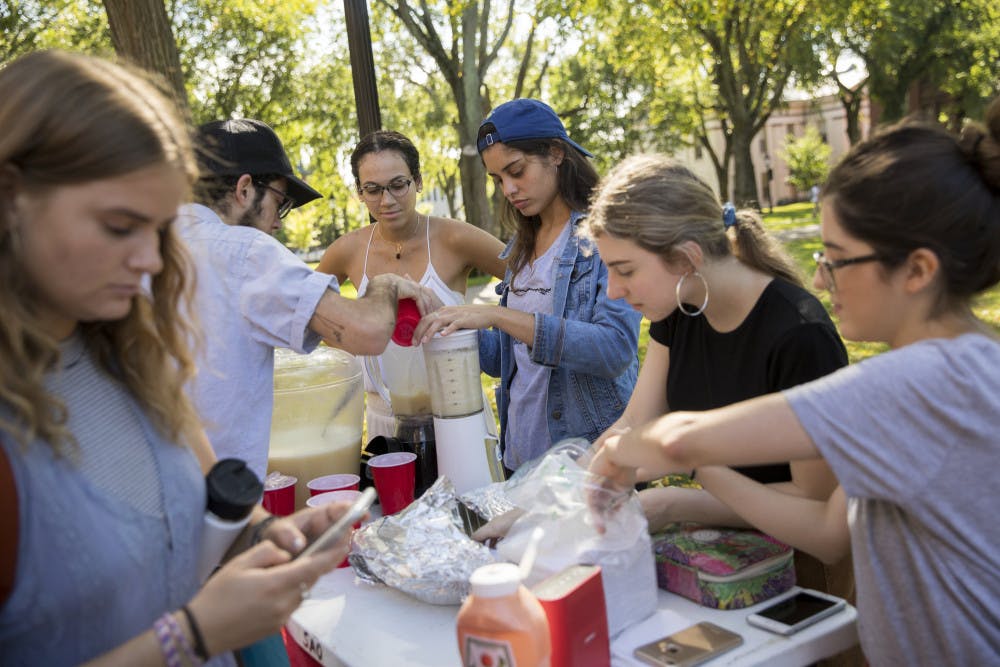Ten days after Hurricane María hit Sept. 20, Rafael Gonzalez Cruz GS heard from his mother for the first time. For Irelys Cordero ’19, it took two weeks. Laura Bosque ’19 has not yet spoken with her grandparents.
About one month later, Puerto Rico is still reeling from the aftermath of María, and Puerto Rican students at Brown have been coping with spotty communication and the knowledge that their hometowns are lacking vital resources, according to multiple students with families affected by the hurricane. Puerto Rican students and faculty have formed the Asociación Puertorriqueña of Brown University to provide a place of comfort for each other and support for their homeland.
The Asociación provides a space to talk about the hurricane and the emotional toll that comes with it.
“A lot of my friends’ families have lost completely everything — have lost their homes, their cars,” Cordero said. “A lot of people are thirsty and hungry … every day. Three weeks after the hurricane, the situation is just as bad as two or three days after it passed.”
Cordero’s family lives in Camuy and Quebradillas, towns far from San Juan. Aid does not reach them as quickly, and they are less likely to have working electricity or cellphone service. She said she struggled during the two weeks before she heard from her family, feeling virtually powerless to remedy the situation at home or contact her loved ones.
“It was a huge, huge, huge emotional crisis for me,” Cordero said. “At the same time, they’re a lot worse (off) than I am. But I had no idea if they were okay, I had no idea if they were alive.”
Gonzalez Cruz has yet to make contact with his brother.
“(The Federal Emergency Management Agency) will look for him because that’s (all) you can do at this point,” he said. He heard from a Facebook friend that his brother was okay, but he has not reached his phone yet.
Gonzalez Cruz brother lives on the east coast of Puerto Rico, which bore the brunt of the storm, but most of his family is located two and a half hours away from San Juan in Aguada. Cellphone communication is limited — Gonzalez Cruz has spoken with his parents four times since the hurricane — but supplies like food have been getting easier to find as the weeks progress and more aid arrives.
In Aguada, FEMA took a week and a half to arrive, he added. His grandmother’s fridge failed during the storm, and her insulin went bad, so he had to use social media to ask people back home to help her. “People were able to reach her and nothing happened,” Gonzalez Cruz said. “But there’s people in my Facebook that have unfortunately reported that their relatives died.”
The Asociación is also working to raise funds and advocate for Puerto Rico. Bosque and Cordero — before the creation of the Asociación — raised $3,000 for Unidos Por Puerto Rico, a relief fundraiser coordinated by the Puerto Rican governor’s wife, by selling tostones and piña coladas on the Main Green. Gonzalez Cruz met with Marisa Quinn, chief of staff to the Provost, to discuss the University’s effort to bring students from the University of Puerto Rico to the University for one to two semesters. They are also planning a teach-in about Puerto Rican political and economic problems, which have been magnified by the hurricane.
The teach-in, which is tentatively planned for November, will offer insight into Puerto Rico’s debt crisis and the downfalls of the lack of statehood. This includes the Jones Act, which mandates all shipping traveling to or from Puerto Rico must stop first at a U.S. port, making imported and exported goods more expensive, Bosque said. Gonzalez Cruz and Bosque hope to distribute flyers at the teach-in asking students to call their senators, asking them to repeal the act.
“A lot of people … were expecting the (United States) to come to our aid immediately, because we are part of the (United States),” Gonzalez Cruz said. “That didn’t happen. And then every help that we get seems to come with a fine print … It shows you the second-class citizenship very clearly.”
Puerto Rico is a U.S. territory and has one non-voting delegate in Congress. On Thursday morning, President Trump tweeted that they could not “keep FEMA, the Military & the First Responders … in P.R. forever!”
“When Harvey hit Texas and Irma hit Florida, he had tweets saying he would help them no matter what,” no matter how long the recovery effort took, Gonzalez Cruz said.
Students said they have felt powerless at times since the hurricane hit, but they believe Brown students can take action.
“Don’t stop being interested and don’t stop posting about it online,” Cordero said. “Don’t let this issue go quiet in the media. Advocate for it and don’t stop talking about it, and donate if you can. Even the smallest amount counts.”





